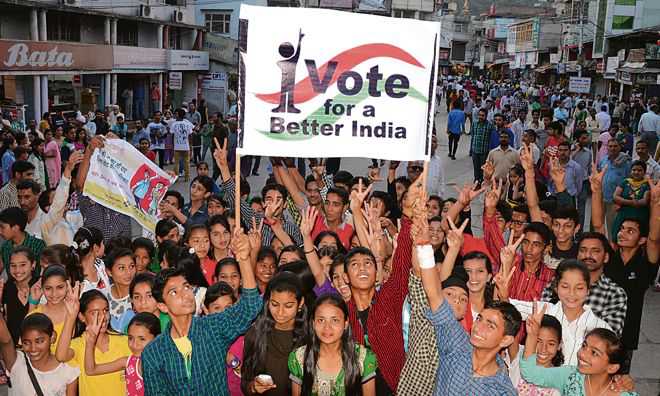
It’s duty too: The voter must know who exactly he/she is voting for.
Madabhushi Sridhar
Former central information commissioner
The National Election Watch (NEW) and Association for Democratic Reforms (ADR) have analysed the affidavits of 8,163 candidates out of 8,230, who have contested the 2014 Lok Sabha polls, and discovered that 1,398 (17%) candidates have declared criminal cases against themselves, while during the 2009 Lok Sabha elections, 1,158 (15%), of 7,810 candidates analysed, had declared such cases against themselves and 889 (11%) were involved in serious criminal cases. And 608 (8%) candidates declared the cases against them. There are 2,208 (27%) crorepati candidates, and Rs 3.16 crore is the average assets of candidates.
The voters now know how many criminals are representing them in Parliament and Assemblies, thanks to organisations like the ADR, intellectual leaders like Prof Trilochan Sastry, socially relevant lawyers like PP Rao and judges like P Venkatram Reddy.
On International Women’s Day, the ADR and NEW reported that there were only 9% women MLAs and MPs across the country in 2019. Hundreds of men who declared cases of crimes against women against them were given ticket by key parties, with the BJP giving the highest number at 54. Of 1,642 MPs/MLAs with declared criminal cases, 52 have cases related to crimes against women. The second highest number of such candidates, 37, were given ticket by the BSP, followed by 30 from the Congress.
No politician or party was interested in telling people about their candidates or the selection criterion. No party is ashamed to offer ticket to a person who crossed over to it a night before. Some leaders wait with ‘B’ form for those who could not procure ticket and hence defect to their party!
It was because of a PIL petition that the candidates are now compelled to reveal their criminal, academic and wealth background. The ADR and the People’s Union for Civil Liberties (PUCL) filed a PIL before the Delhi High Court to make the electoral process more transparent. The Election Commission (EC) should have required all candidates to disclose background information to the public, but it did not do so, until the Supreme Court mandated it. Ruling that a candidate’s background should not be kept in the dark in the interest of democracy, the Delhi HC ordered the EC to obtain such information. The Union of India challenged the decision through an appeal to the SC, arguing that the EC and the HC did not have such powers and that the voters did not have a right to such information!
Two significant rulings were given by the court: (1) When the legislature is silent on a particular subject and an entity (in this case, the EC) has been granted implementation authority with respect to such subject, the court assumes that the entity has the power to issue directions to fill such a void until a law is enacted. The court confirmed that Article 324 ‘operates in areas unoccupied by legislation’ and that ‘the silence of a statute has no exclusionary effect except where it flows from necessary implication’. The court’s power to issue directions pursuant to Article 324 is plenary. By extension, the EC can issue directions for transparency in the poll process.
(2) Citizens have a right to know about public functionaries, which is derived from the concept of freedom of speech and expression and which includes the right to know about the backgrounds of candidates for public office. The public has a right to know about candidates contesting elections because such rights include the right to hold opinions and acquire information to be informed in forming and disseminating those opinions throughout the election process. The court advanced this point by observing that a democracy strives toward an ‘aware citizenry’ and misinformation or non-information will create ‘uniformed citizenry which makes democracy a farce’. The EC was directed to issue orders to compel each contestant to give information about criminal charges, convictions, any pending cases, assets including those of spouse, liabilities, and educational qualifications.
Judicial wisdom did not appear to be democratic wisdom for politicians. In 2002, led by PM Vajpayee, they responded to the judgment by amending the Representation of the People Act, which required a candidate to provide information ‘as to whether he is accused [or convicted] of any offence punishable with imprisonment for two years or more in a pending case’. Most important, no candidate could be compelled to disclose any additional information, ‘notwithstanding anything contained in the judgment of any court or directions issued by the Election Commission’. This is the real face of political parties, whether it be the BJP or Congress, left or centre.
Again the SC examined constitutional validity of Section 33B in the case Union for Civil Liberties and Another (PUCL) v. Union of India and Another. Justice Venkatram Reddy in the 2003 judgment held: Section 33B inserted by the Representation of People (3rd Amendment) Act, 2002, does not pass the test of constitutionality, firstly, for the reason that it imposes a blanket ban on dissemination of information other than that spelt out in the enactment, irrespective of the need of the hour and the future exigencies and expedients, and secondly, the ban operates despite the fact that the disclosure of information now provided for is inadequate. Because of this order, today, every candidate is explaining his/her background through affidavit.
Recently the ADR conducted a nationwide survey involving over 2.7 lakh people that revealed that for 41.34% respondents, distribution of liquor, cash and freebies was an important factor behind voting a particular candidate. But 97.86% interviewees felt that candidates with criminal background should not be elected. But it is sad that 35.89% of them were willing to vote for a candidate with criminal records if the candidate had done good work in the past.
It is the duty of the voter to think if he/she is voting a criminal, or a bankrupt/corrupt or an uneducated criminal or an educated leader.



























